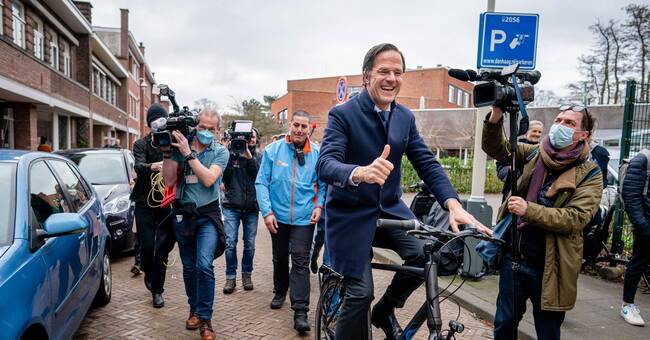Parliamentary elections in the Netherlands have been going on since Monday to reduce the risk of spreading the infection.
The main favorite is Prime Minister Rutte and his right-liberal VVD, which is once again expected to be the largest party.
A polling station survey on Wednesday night gives VVD 35 seats - an increase of two compared to the 2017 election.
In that case, a historic fourth election victory in a row for VVD.
Success for D66
The second largest according to the polls will be the left-liberal and strongly EU-friendly governing party D66, which sprinted strongly under the leadership of Minister of Trade Sigrid Kaag.
D66 is now expected to get 27 seats, eight more than last time.
If the polling station survey is correct, they beat their previous election record of 24 seats from 1994.
Thus, it does not matter that the other two governing parties - the Christian Democratic CDA and the small Christian party CU - lose a total of six seats.
The government can still remain, if it so wishes.
In fact, VVD, D66 and CDA also have the opportunity to do without CU, and still get a majority.
"The Teflon Man"
Rutte has ruled in various coalitions since 2010 and can now enter his fourth term as head of government.
Without being directly popular, the 54-year-old from The Hague has become increasingly popular over the years, at the same time as he has also been nicknamed the "Teflon man" for his ability to shake off political criticism and scandals.
The fact that the majority of the inhabitants, after all, have given the government approval for pandemic management speaks in Rutte's favor.
- I have taken responsibility for the past ten years.
I am trying to govern, in difficult circumstances, the Prime Minister himself said in a final televised debate on Tuesday night.
Populist critique
During the corona pandemic, however, the government has had to fight against harsh words from both the opposition and the public.
The two EU-critical populist parties PVV and FVD have attacked from different directions.
PVV and its leader Geert Wilders want to see more money for their own healthcare instead of helping hard-hit EU countries such as Italy and Spain.
The FVD, led by Thierry Baudet, in turn captures the voices of those who believe that the government's corona measures are too drastic - and even see the whole pandemic as a conspiracy.
In the polling stations, PVV lands on 17 seats (-3), while FVD gets 7 seats (+5).
The big losers in the election are at the same time the left-wing party SP and the environmentalist Groen Links, both of which are expected to lose 6 seats, from 14 to 8 each.
In total, up to 17 parties seem to take place in the lower house.

